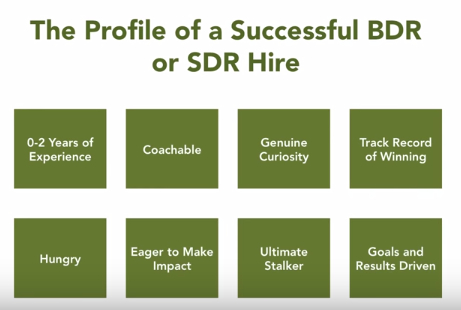How to Hire Talented Sales Development Reps (SDRs)
A team of all-star sales development reps (SDRs) can be your golden ticket to growth. Successful SDRs will not only source more appointments for your account executives, but also better appointments. And as long as you have competent account executives, more appointments with high-quality leads will create more opportunities and revenue. That’s why it is so important to hire the right SDRs.
The trouble is, that most SDRs have less than 2 years of experience (many are fresh out of college). So you can’t rely on long track records of crushing quota, like when you’re hiring your account executives.
So what should you be looking for when hiring SDRs? We recently joined RingLead’s John Kostouros and OpenView Partners’ Sales Strategist CeCe Bazar in an awesome webinar on inside sales hiring and compensation that tackled that question.
7 Habits of Highly Successful SDRs
The webinar delivered 7 crucial qualities to look for in new SDR hires:
Coachability
Most SDRs are early in their career. As a general rule, most SDRs are going to be open to feedback from managers and account executives. But I think we all have met individuals that just don’t take direction well. Confidence is an awesome quality. But you probably don’t want to hire SDRs with a my-way-or-the-highway attitude. Being an SDR requires a lot of team work. So if you sense a rep might be overly cocky or obstinate, you might want to take a pass. Instead, look for reps with a positive, teachable attitude.
Genuine Curiosity
Being a successful SDR routinely involves asking a lot of questions. And the best SDRs are curious by nature. They’re natural problem-solvers who genuinely want to discover their prospects’ business drivers. They’re good listeners who can find the best ways to help their prospects succeed. And as a result, they’ll be more successful as SDRs.
Track Record of Winning
I realize that most SDRs probably aren’t going to have a long resume. But you don’t have to be an experienced salesperson to be a winner. Some of the best salespeople are athletes and participated in organized sports at the high school or even collegiate level. Try to find evidence that an SDR will go the extra mile to achieve victory. If they’ve had sales jobs before, call their references. If not, look for those indicators that they possess a winning spirit (e.g. playing on sports teams, graduating with a high GPA, becoming an Eagle Scout, etc.)
Hunger
You want reps that are hungry. You want reps who are happy to work longer hours to move hot deals forward. Look for those SDRs who see themselves as future VPs of Sales or even CEOs. Look for reps who view their OTE as a mere starting point.
Eager to Make an Impact
The best SDRs, from day one, are going to be looking for ways to make an impact. You don’t just want to hire clock-punchers. You want reps who will, in the best way possible, make their presence known.
The Ultimate Stalker
Many millennials are well-versed in social media. This should be a mandatory requirement for SDRs. You want reps who are already coming to the table with throngs of social media connections. But more importantly, you need reps who know how to leverage social media (social selling), the internet, and other sources to discover relevant data about prospects. So look for reps who are great at stalking prospects (but are hopefully not creepy to work with).
Goals and Results-Driven
SDRs need to hit a lot of goals. Routinely they have to create a book amount of meetings and create opportunities. More sophisticated sales organizations also track SDRs activity goals. For example, they might require SDRs to make 50 calls and send 30 emails in a day. Therefore, it’s vital to hire SDRs that actually enjoy meeting those goals. For goal-driven SDRs, making 50 calls in a day will seem more like a game than a burden.
Without great SDRs it can be nearly impossible to achieve dependable growth. But by hiring reps that possess these seven crucial qualities, you can help ensure that your account executives always have the opportunities they need to crush their revenue numbers.
The Key SDR Traits
In TOPO’s Sales Development Benchmark Report, 88% of respondents cited SDRs as an important channel in their outbound strategy. Combined with an increasing emphasis on the importance of live call execution and conversational skills, it’s clear that the role of a sales development rep has changed.
This change necessitates a shift in the skillset and qualities needed to be successful as an SDR. The problem lies within the fact that sales development reps are typically at the bottom of the sales hierarchy and are the most junior sales reps within the organization, meaning the SDR talent pool will have the least amount of sales experience. Therefore, SDR hiring is somewhat different than the talent acquisition process for other sales roles, as there is less real-world experience an proven performance to rely on.
So what skills should you look for when hiring an SDR? Obviously each organization will have its own set of requirements, but in general, there are key traits that everyone should look for.
Coachability
Coachability is perhaps the most important factor when hiring any salesperson. When someone in the workplace is coachable, it means they are receptive to feedback, open to constructive criticism, don’t take feedback negatively, and use that feedback to improve themselves, regardless of who or where it comes from. If a sales rep is coachable, it means they can openly accept feedback and suggestions from peers, managers, and even other teams and that they act on that feedback in an attempt to improve.
If a rep is coachable, they have the potential to be incredibly successful in any position, as they are capable of exponentially improving their performance with the help of others.
You can tell if someone is coachable if they:
- Are truly open to feedback
- Are excellent listeners
- Take ownership and responsibility for their performance
- Are humble
- Are self-aware
- Seek input from others
- Are accountable
Persistence
Sales is a very hard job. No matter how good or experienced a rep is, they face rejection all day, every day. Contacts hang up the phone, demos fall through, opportunities get lost, and it’s very easy to become dejected very quickly.
Look for reps that never back down and have a “never say die” attitude. SDRs are at the front lines of the sales process, and therefore must make cold calls, perform prospecting, and find their way to leads. This exposes them to a massive amount of rejection and frustration. But the best reps will not stop, and will not get rejected, no matter what. They are impervious to the word “no,” find ways to work around blockers and maintain optimism.
Conversational Skills
Sales is becoming more and more conversational. Email inboxes are full to the brim with spam messages and templated emails that everyone has seen again and again. The true way to forge personal connections and move deals forward is over the phone. However, this means that development actually have to speak with contact or leads.
Modern-day sales development reps need to be excellent communicators, capable of having meaningful, relatable conversations with strangers whom they have never seen. They need to forge relationships while simultaneously diagnosing problems and presenting solutions to garner interest.
Desire to Grow
In order to be successful, a sales rep must have a desire to grow. Especially with the average SDR tenure hovering around 16 months, the best organizations will align their SDR’s career growth plans with progression through the sales team. This will increase rep retention, which generates a greater return on investment on the hire, and more importantly, keep tribal knowledge within the organization. Sales reps who know their products and have seen how it is used are better prepared to sell it as a solution.
Reasons Your Best SDR Hire Might Have No Sales Experience
I’m going to give you four compelling reasons why sales experience shouldn’t be your primary concern when hiring new SDRs.
One of the most common things that managers look at before hiring new sales development reps (SDRs) is a proven track record of success. I get it. Not everyone has what it takes to make it in sales, and turnover can be costly. In fact, DePaul University’s Sales Effectiveness Study found the average cost of turnover for a single sales rep to be a whopping $114, 957!
But consider that when it comes to SDRs, your hiring assumptions may be all wrong.
 Reason 1: It’s Easier to Teach Than Un-teach
Reason 1: It’s Easier to Teach Than Un-teach
It’s easier to teach good habits than un-teach bad ones. As an example, I’ll share a brief story about a time that my own bad habits caused me to fail at something. Back in college I started taking classical guitar lessons with my girlfriend at the time. I had been playing guitar for 5-6 years already and could bust out a pretty mean rock and roll lead guitar. My girlfriend, on the other hand, had barely touched a guitar. For me it was a struggle. Classical guitar requires you to hold a guitar differently, sit differently, hold your hand differently … just about everything is different. I had already developed heaps of “bad” habits that I needed to unlearn. My girlfriend, on the other hand, quickly learned the “good” habits, and within 6 months was better than I was at classical guitar. I ended up getting frustrated and went right back to playing rock and roll.
The same is true in sales. I’ve seen sales reps who are wildly successful at one company move over to another company and fail. The reason is that they’ve built up habits to win at a previous company that might not translate to their new role. They might not follow up with leads as fast as you’d like or use CRM incorrectly. However, first-time SDRs will have no bad habits to unlearn.
Experts agree. During a recent webinar we participated in, one panelist, OpenView Partners’ Sales Strategist CeCe Bazar advocated for hiring millennials SDRs who are unseasoned because “they are often fresh out of school coming in with the blank slate, therefore, they are an ideal profile because they don’t have many bad habits in need of breaking.”
Reason 2: Competition for New Reps is Stiff
Right now sales recruiting is truly a sellers market. VCs, board members and C-level execs are putting increasing pressure on sales leaders to ramp up sales teams quickly. As a result, competition for experienced reps is at an all-time high. And as a result, average experience at hire for SDRs is at an all-time low (1.8 years according to The Bridge Group). Rather than spending more for SDRs with more experience, it might make more sense, before making a hire, to predict which SDRs have the capacity to succeed.
Reason 3: They Have Something to Prove
I’ve heard millennials called “entitled” and “lazy.” But time and time again, I’ve found the opposite to be true. The right hires will, from their first day, be looking for opportunities to add value. They will do everything in their power to turn their first post-college job into a success story. They will endeavor to fit in with your company’s culture. Then, they will try to stand out by being exceptional. They will work longer hours when necessary. And with the right tools and training, they can outperform those more experienced reps that your competitors paid so much to hire.
Reason 4: They Are the “Ultimate Stalkers”
Chances are that there is a lot of useful data on the web about any given prospect or account. The best SDRs can not only gather that information, but do so quickly. A great point that CeCe Bazar made during our webinar was that young sales hires tend to be “the ultimate stalkers.”
Think about it. Many millennials are often already masters of using social media to gather information. The same set of skills that they’re using to Google prospective Tinder dates can easily translate into finding useful details about sales prospects from LinkedIn and other sources.
Tips from Experts on Hiring SDRs
If you’re like many sales leaders, you’re feeling the pressure to onboard and ramp up a sales team quickly. It can be tempting to hire any rep who seems reasonably intelligent and likable. And sure, the right sales coaching and sales tools can help most reps perform better. But that doesn’t mean you should hire every rep you interview.
I’m all for giving salespeople a chance to prove themselves, but some hires are just a waste of time. Some reps just won’t work out for a variety of reasons including:
- Some people just aren’t suited for a job in sales. Sales isn’t for everyone. Salespeople need a ton of self-discipline, amazing communications skills (verbal and written) and tons of hustle!
- Not everyone is a cultural fit. Every sales culture is different. One rep that might make the president’s club at one organization will strike out at another.
- Some reps just aren’t team players. Just because a rep has past record of success, it doesn’t mean that they will have a net-positive effect on your sales organization. There are a lot of ways to be successful in sales, and not all of them are ethical. As an example, I’ve heard horror stories about account executives bribing SDRs to route them leads that should be going to other AEs.
Hiring the wrong rep is costly. Think of all the time that goes into training a single sales rep. That’s why it’s so important to do your best to hire reps that will succeed in your sales organization.
In order to help you hire the right reps, we asked some sales experts we trust to reveal some red flags that you should avoid when hiring salespeople.
“When evaluating sales candidates, the three red flags which cause me to rule out an otherwise strong candidate are: a lack of attention to detail, a mediocre understanding of the value proposition of the solution we are selling and poor alignment with the desired results of a sales personality profile test. Of these variables, the most important ones are the ability to demonstrate great attention to detail as well as a personality profile that is tightly aligned with traits we typically seek. We utilize an interview process that allows us to adequately assess all of these variables and use data to more objectively assess candidates.”
 -Matt Tortora
-Matt Tortora
Vice President of Sales, Goby
“Three red flags that cause me to rule out an otherwise good sales candidate:
1. Inability to be specific about how they have achieved success (What I look for: past W2s, names of specific strategic deals, process for closing specific deals, how he/she leverages other team members)
2. Unable to persevere (What I look for: examples of past challenges and how they overcame them)
3. Lack of skepticism (What I look for: questions about company vision, strategy and roadmap, desire to meet potential peers).”

-Alana Kadden Ballon
Principal, Inqune
“When hiring, everything a candidate does or says should be observed very closely. They are at their best to impress and secure the job. There are many red flags that are often ignored, or worse, excused away that are indicators of how they will behave and perform after hire.
There are several universal red flags we look for when we help our clients hire: untimely follow-up, lateness, low energy, bad attitude about previous employers, lack of research on the company, lack of asking questions or being curious about more than pay, schedule, and benefits. We also look for their ability to communicate effectively in writing and on the phone.
There are also different red flags depending on the role. After you have identified the attitude and behaviors needed for the specific sales role, there are red flags when they don’t exhibit the right attitudes, skills, and behaviors in those areas. For example: if the sales process is long and has many months of follow-through and the candidate doesn’t follow-up with you in a timely manner, red flag. If the job involves a lot of emailing, then poor writing in messages to you is a red flag. If the job involves detailed proposals and calculations, typos in any correspondence are a red flag.
Candidates let us know who they are throughout the process. Focus on the actions, words, and attitude.”
 Nancy Bleeke,
Nancy Bleeke,
President and Chief Sales Officer, Sales Pro Insider
Looking to motivate your SDRs to succeed? Our latest eBook reveals how to structure and implement powerful compensation plans for your sales development team.
FAQs about Hiring High-Performing Sales Development Reps (SDRs)
What traits should you look for when hiring an SDR?
When hiring an SDR, look for coachability, persistence, curiosity, strong conversational skills, and a hunger to grow. These traits often outweigh direct sales experience. A coachable and resilient rep can quickly absorb feedback, adapt to your process, and develop into a top performer.
Is sales experience necessary to be a successful SDR?
No, many top-performing SDRs start without prior sales experience. Traits like grit, adaptability, and research skills are often more predictive of success. Fresh hires may also be easier to train since they come without bad habits formed at previous jobs.
How can you tell if an SDR candidate is coachable?
Coachability shows in how a candidate responds to feedback during interviews. Signs include active listening, openness to critique, humility, and a willingness to learn. Candidates who ask thoughtful questions and show self-awareness often have strong growth potential.
What are common red flags to avoid when hiring SDRs?
Red flags include poor follow-up, lack of curiosity, vague success stories, or negative talk about former employers. Also be cautious of those who show disinterest in learning about your product or fail to prepare for the interview—it signals a lack of initiative.
Why is curiosity important in SDRs?
Curious SDRs are better at discovery. They ask smart questions, seek to understand the prospect’s business, and tailor outreach accordingly. This improves conversation quality and lead qualification, leading to more valuable appointments for account executives.

